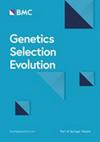Exploring the potential of incremental feature selection to improve genomic prediction accuracy
IF 3.6
1区 农林科学
Q1 AGRICULTURE, DAIRY & ANIMAL SCIENCE
引用次数: 0
Abstract
The ever-increasing availability of high-density genomic markers in the form of single nucleotide polymorphisms (SNPs) enables genomic prediction, i.e. the inference of phenotypes based solely on genomic data, in the field of animal and plant breeding, where it has become an important tool. However, given the limited number of individuals, the abundance of variables (SNPs) can reduce the accuracy of prediction models due to overfitting or irrelevant SNPs. Feature selection can help to reduce the number of irrelevant SNPs and increase the model performance. In this study, we investigated an incremental feature selection approach based on ranking the SNPs according to the results of a genome-wide association study that we combined with random forest as a prediction model, and we applied it on several animal and plant datasets. Applying our approach to different datasets yielded a wide range of outcomes, i.e. from a substantial increase in prediction accuracy in a few cases to minor improvements when only a fraction of the available SNPs were used. Compared with models using all available SNPs, our approach was able to achieve comparable performances with a considerably reduced number of SNPs in several cases. Our approach showcased state-of-the-art efficiency and performance while having a faster computation time. The results of our study suggest that our incremental feature selection approach has the potential to improve prediction accuracy substantially. However, this gain seems to depend on the genomic data used. Even for datasets where the number of markers is smaller than the number of individuals, feature selection may still increase the performance of the genomic prediction. Our approach is implemented in R and is available at https://github.com/FelixHeinrich/GP_with_IFS/ .探索增量特征选择提高基因组预测准确性的潜力
单核苷酸多态性(SNPs)形式的高密度基因组标记的可用性不断增加,使得基因组预测,即仅基于基因组数据推断表型,成为动植物育种领域的一种重要工具。然而,在个体数量有限的情况下,由于过度拟合或不相关的SNPs,变量(SNPs)的丰度会降低预测模型的准确性。特征选择有助于减少不相关SNP的数量,提高模型性能。在这项研究中,我们研究了一种基于根据全基因组关联研究的结果对SNPs进行排序的增量特征选择方法,该研究将随机森林作为预测模型,并将其应用于几个动物和植物数据集。将我们的方法应用于不同的数据集产生了广泛的结果,即从少数情况下预测精度的大幅提高到仅使用一小部分可用SNP时的微小改进。与使用所有可用SNP的模型相比,我们的方法能够在几种情况下实现相当的性能,SNP数量显著减少。我们的方法展示了最先进的效率和性能,同时具有更快的计算时间。我们的研究结果表明,我们的增量特征选择方法有可能大幅提高预测精度。然而,这一增长似乎取决于所使用的基因组数据。即使对于标记数量小于个体数量的数据集,特征选择仍然可以提高基因组预测的性能。我们的方法在R中实施,可在https://github.com/FelixHeinrich/GP_with_IFS/。
本文章由计算机程序翻译,如有差异,请以英文原文为准。
求助全文
约1分钟内获得全文
求助全文
来源期刊

Genetics Selection Evolution
生物-奶制品与动物科学
CiteScore
6.50
自引率
9.80%
发文量
74
审稿时长
1 months
期刊介绍:
Genetics Selection Evolution invites basic, applied and methodological content that will aid the current understanding and the utilization of genetic variability in domestic animal species. Although the focus is on domestic animal species, research on other species is invited if it contributes to the understanding of the use of genetic variability in domestic animals. Genetics Selection Evolution publishes results from all levels of study, from the gene to the quantitative trait, from the individual to the population, the breed or the species. Contributions concerning both the biological approach, from molecular genetics to quantitative genetics, as well as the mathematical approach, from population genetics to statistics, are welcome. Specific areas of interest include but are not limited to: gene and QTL identification, mapping and characterization, analysis of new phenotypes, high-throughput SNP data analysis, functional genomics, cytogenetics, genetic diversity of populations and breeds, genetic evaluation, applied and experimental selection, genomic selection, selection efficiency, and statistical methodology for the genetic analysis of phenotypes with quantitative and mixed inheritance.
 求助内容:
求助内容: 应助结果提醒方式:
应助结果提醒方式:


